General
Mak-Sida International Conference Calls for more Research and Innovations
Published
11 years agoon
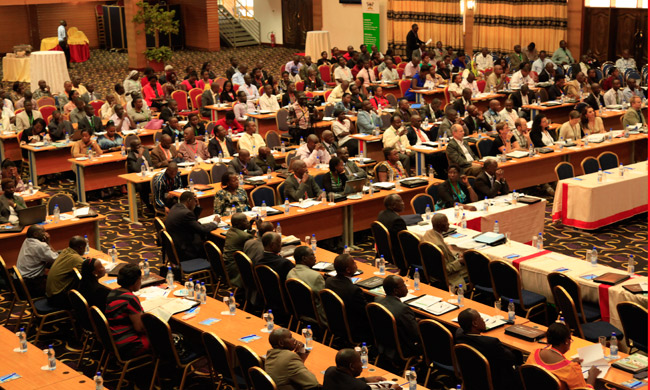
The Mak-Sida International Research and Innovations Dissemination two-day Conference closed with a call for more research and innovations across the different disciplines. The Conference, held under the theme ‘Community transformation through Research, Innovations and Knowledge Translation’, brought together scholars from different parts of the world to share their research findings across five sub themes of: Health and Health Systems; Natural Resource Utilisation, Conservation and Environmental Sustainability; Food Security, Safety and Value Addition; Culture Socio-Economic Transformation, Social Justice, Governance, Conflict and Disaster Management; and Advances in Education, Science and Technology. Over one hundred (100) papers were presented across these themes as both oral and poster presentations.
In her special paper presentation on Viral Hemorrhagic fevers, Dr. Monica Musenero Masanza, the Assistant Commissioner Epidemiology and Surveillance in the Ministry of Health, shared that more research needs to be conducted to avert the effects of such fevers. She shared experiences from the Ebola hit Central African region, where she was actively involved in combating the scourge.
“Viral hemorrhagic fevers (VHFs) are caused by four distinct families of viruses. These include: Arena viruses (Lassa fever), Filo Viruses (Ebola and Marburg fever), Bunya viruses (Cremean Congo) and Flavi viruses (Yellow fever),” she said. “The absence of locally available research has led to delayed recognition of these viruses which are mainly hosted in animals, since human beings are accidental hosts. It is still not known where the virus really hides. We start running after seeing deaths. It catches us by surprise because the origin is unknown. There is need for more research to combat the high tendency of recurrence of these fevers. I am here to stir you as academic institutions to engage more in both basic and intensive research,” she emphasized.
Dr. Musenero continued to share the courageous fight to contain ebola in West Africa, particularly the countries of Liberia, Sierra Leone, Guinea, Cameroon, where she headed the medical team. After her presentation, the audience gave her a befitting standing ovation.
Susanne Spets, the Deputy Head of Mission of the Embassy of Sweden, who represented the Swedish Ambassador, H.E. Urban Andersson, observed that Sida support is aimed at improving conditions in Uganda. “One third of the activities supported by Sweden are in the area of Medical Sciences. The investment is expected to contribute to an improved health status of ordinary Ugandans,” she said. “The agreement period has included the preparation for a new agreement 2015- 2020. The process has included an open call for projects proposals with Swedish University partners. 17 projects that will be implemented by 5 universities in Uganda and their 11 Swedish University partners have been selected.
The Chairperson Makerere University Council, Eng. Dr. Charles Wana Etyem represented by the Deputy Chairperson of Council, Hon. Irene Ovonji Odida observed that, “Being the premier academic institution in Uganda, Makerere University is a major source of various home-grown innovations and technologies that are contributing to the transformation of our society. Many of these ground-breaking innovations and technologies have been hatched through the Sida bilateral research programme. Our work through the Sida research programme has contributed to the enhancement of Makerere University’s visibility and performance, thereby positioning Makerere University at the forefront of the global knowledge economy. We therefore thank Sida for being a strategic partner to human resource capacity building in this country as shall be exhibited in the presentations at this conference.
Day one of this conference,20th April 2015, was presided over by the Minister of Education, Science, Technology and Sports, Hon. Jessica Alupo, who was grateful for the Swedish Government support to Uganda. “The Government of Uganda will also continue supporting initiatives aimed at promoting research and innovation. As you may be aware, the Government has already made significant impact through the Presidential Science Initiative, to which H.E The President of Uganda, committed UGX.25billion to support research and innovations in science-based colleges at Makerere University. The funding has also helped Makerere to put up state-of-the-art teaching and research laboratories to stimulate scientific innovations.
According to the Makerere University Vice Chancellor, Prof. John Ddumba-Ssentamu, the Swedish Government has supported learning and research at Makerere University to a tune of SEK515.11 million (USD $74 million). “A great proportion of research funding at Makerere University is from Sida. Sida, together with other development partners, has played a fundamental role in augmenting the internally generated funds at Makerere University, which has helped to substantially tackle the chronic shortage of funds for research,” he said in appreciation.
“Research dissemination and translation of outputs into policy briefs has not been successful as would have been desired. Both senior researchers and students have collected plenty of raw data, but these have not been translated so as to make them to be able to serve the reason(s) for which they are gathered. To solve this problem, emphasis, especially in the successor Sida programme, has been put on the proper dissemination of interdisciplinary research findings, thematic research inventories, so as to contribute to and enhance evidence-based policy development. This would make the programme directly relevant to the national development goals,” he added.
The Chairperson Conference Organising Committee, Prof. Mukadasi Buyinza who is also the Director, Directorate of Research and Graduate Training, hailed Sida for the enduring support to Makerere University. Tremendous achievements which include the creation of an environment conducive to high quality relevant research through investment in human resource development, ICT, library resources, laboratory and field site infrastructure have been realized as a result of this support.
“I am happy to report that since 2000 when our cooperation began, over 150 staff have completed PhDs and a host of them have completed master degree programs. This could be attributed to the increased completion rate by doctoral students due to the enhanced capacity for supervisors to supervise graduate students, strong mentorship programme and graduate seminar series coordinated by Makerere University,” he said.
“We are grateful to government through the Ministry of Education Science, Technology and Sports for having secured over US$200 million from African Development Bank and other agencies to finance the improvements and expansion of higher education Science and Technology facilities at the public universities, Makerere University inclusive. The steps the Government has taken are commendable but we urge government to strategically investment more in research and development in order to spark economic growth and human capital development,” he added.
The Chancellor, Prof. George Mondo Kagonyera pointed out that “It is important for academic and research institutions to conduct cutting edge research but as long as that research is not reaching the community it is meant to serve, it remains but a disservice. In order for all this wonderful research to impact community it has to be translated into the language that can easily be understood by members of public, and policy makers in particular. It is only when our research can easily be understood that the policy makers will advance our aspirations and defend our cause when it comes up for debate.”
Dr. Katri Pohjolainen, the Senior Research Advisor at the Swedish Embassy hailed the conference for its output. “The conference has displayed an enormous amount of creativity, perseverance and hard work taking place both in Uganda and Sweden for the past five years. The sessions I did attend were professional, exciting and a learning experience with open and frank discussions. The two days have been an academic exercise of high caliber. I hope all the research results presented will be published and that scientific discoveries will be patented. I hope the research results will reach out to communities and will be translated into policy documents and used by the different organizations and ministries,” she said.
The Deputy Vice Chancellor, Finance and Administration, Prof. Barnabas Nawangwe closed the conference with a call for maximum utilization of the research funding. ”The support we have received should be very well utilized to make a contribution however small to reversing the very sad story of Africa. I believe that Makerere is the greatest University on the African continent. We have people dedicated to their work as demonstrated by the resilience despite all the difficulties people encounter as they carry out first class research, publish in international journals and innovate for society. Let us continue doing so,” he said.
26 people were recognised for their active role in the success of the Makerere-Sida bilateral cooperation over the years. Please see downloads below for that detailed list of recipients.
Article by Marion Alina
Photos by Landmark Media Consultancy Ltd
You may like
General
Makerere Explores Strategic Industry Partnership with Psalms Food Industries to Strengthen Manufacturing Innovation
Published
17 hours agoon
March 4, 2026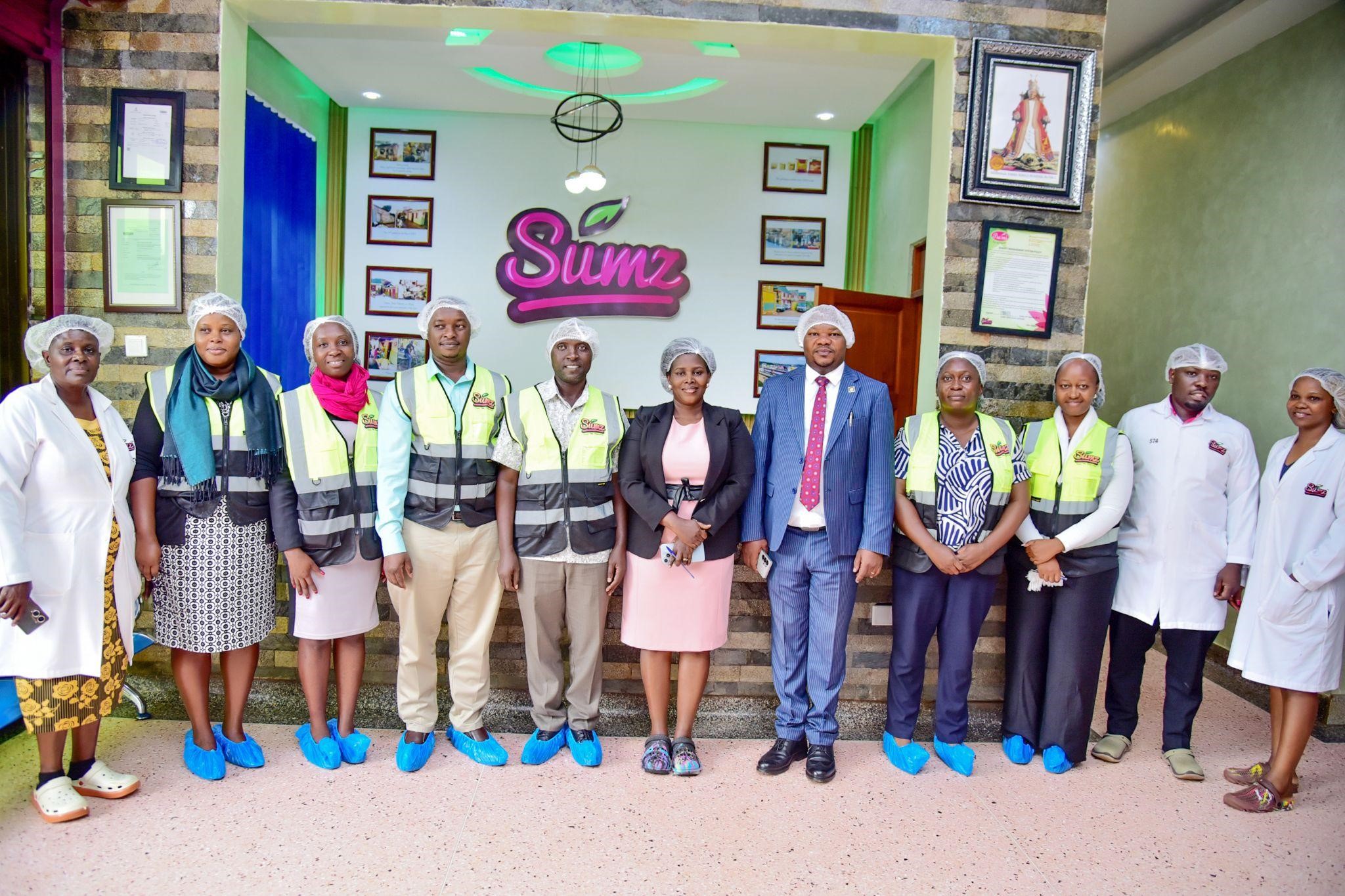
On 2nd March, 2026, representatives from the Advancement Office, the College of Business and Management Sciences and the University Innovation Pod visited Psalms Food Industries to discuss a prospective partnership aimed at strengthening university–industry collaboration in manufacturing, research, innovation, and skills development.
Psalms Food Industries, a homegrown snacks innovation and manufacturing company, operates three major brands, namely, Sumz, Afrikan Harvest and Krunchables, which have grown to a range of 37 products and target the introduction of five new products annually. The company distributes products across Kenya, Rwanda, the Democratic Republic of Congo, South Sudan, and, recently, Tanzania. As a labour of love, the idea of producing snacks was born during the honeymoon of Mr and Mrs Ngabirano, who now run Psalms Food Industries side by side.
Dr. Denis Ngabirano, CEO and Co-Founder of Psalms Food Industries, during the meeting, described the company as “a snacks innovation house, with all our products developed in-house.” He noted.
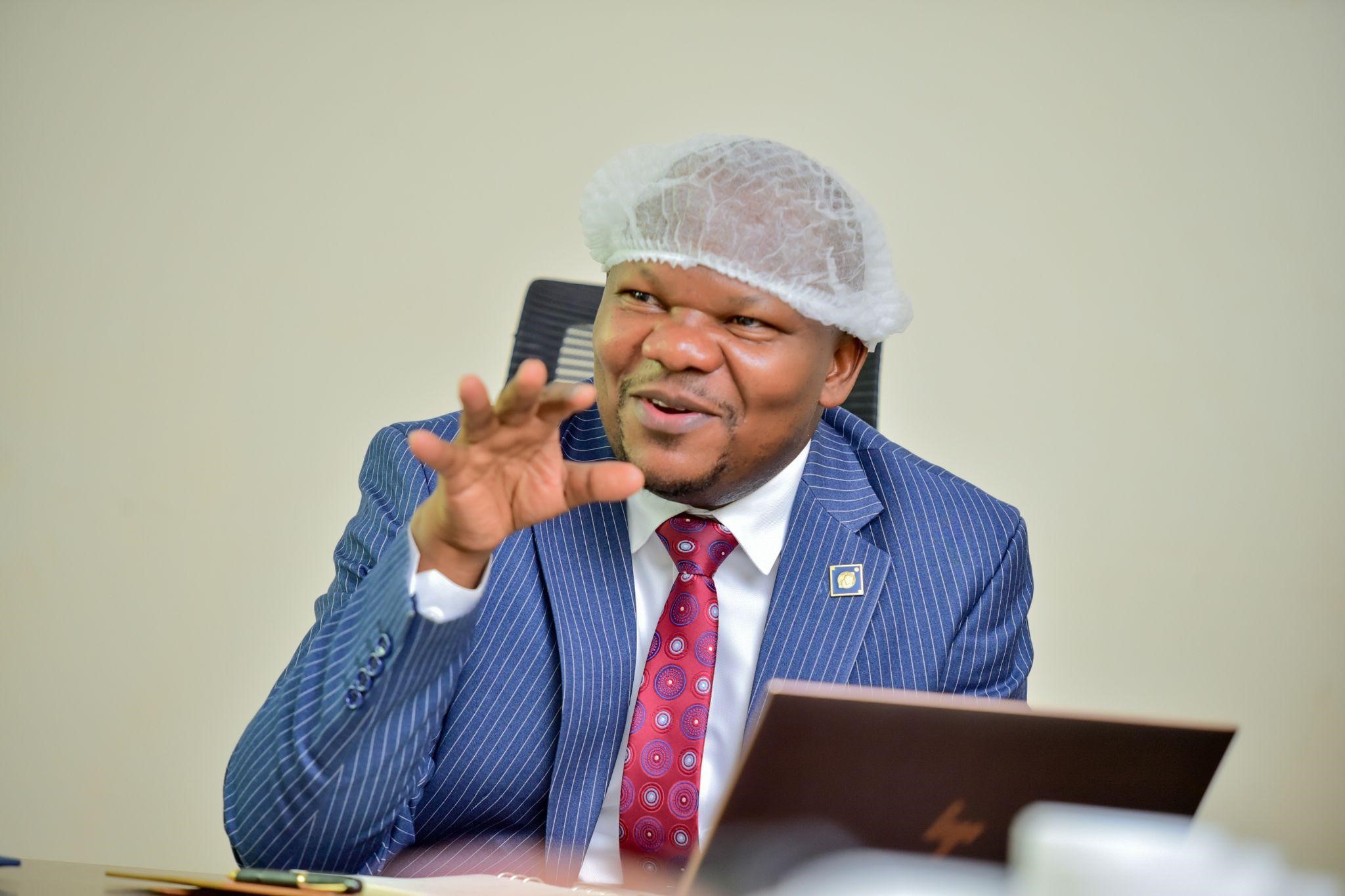
He emphasised the company’s commitment to quality assurance and consumer-centred research, noting that Psalms conducts surveys and gathers customer feedback to inform product development, supported by an internal microbiology and chemistry laboratory.
Dr. Denis Ngabirano noted that the company had only recently introduced two brands, “Afrikan Harvest for it’s health conscious clientele and Kruchables for it’s volume centric clientele.
“Afrikan Harvest has no additives, it is a brand for health-focused consumers,” he explained, while highlighting the differentiated positioning of their product lines. “Sumz is our premium brand, and Krunchables focuses on volume.”
Student-Centered Experiential Learning
A key focus of the meeting was structured experiential learning for students across disciplines. Potential areas of collaboration include internships, graduate trainee pathways, and hands-on exposure within Psalms’ incubation and production facilities.
The proposed engagement spans multiple fields, including environmental sciences, engineering, procurement and logistics, finance and accounting, quality control, production and manufacturing, human resource management, marketing, and international business.
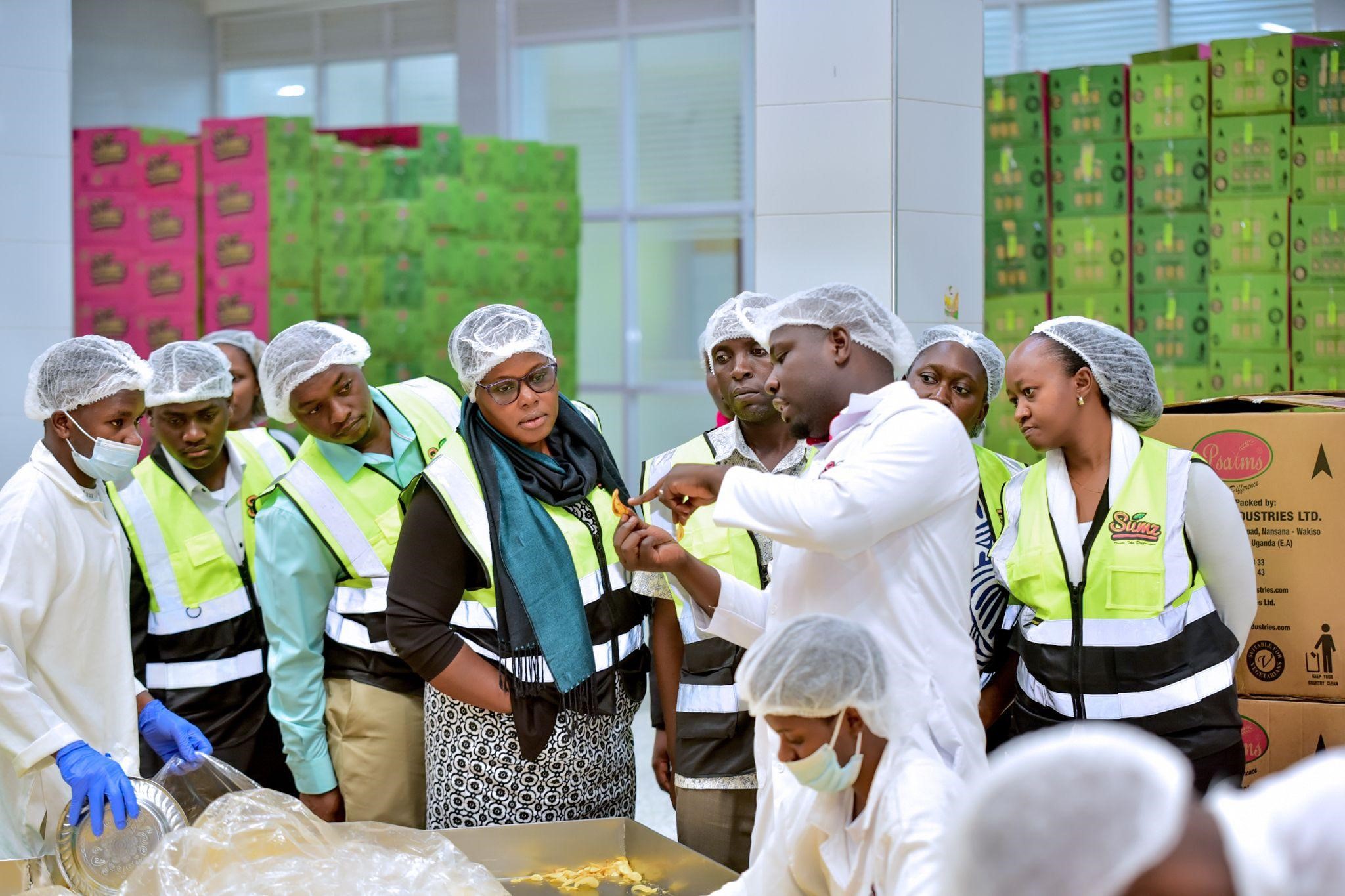
The partnership could provide students with direct exposure to real-time production systems, standard operating procedures (SOPs), and quality assurance frameworks, strengthening the practical relevance of their academic training.
Among the innovative ideas discussed was a potential competition involving students from the Fine Art and Industrial Design disciplines to redesign packaging for selected Sumz products. The proposal would allow top designs to be commercially adopted, creating a direct bridge between creativity, intellectual property development, and industrial application.
Research, Innovation and Commercialisation
Both institutions expressed interest in joint applied research initiatives, particularly in process optimisation, data analytics for manufacturing efficiency, product improvement, and sustainable production systems.
Opportunities were also discussed around collaborative research in machine design, crop development for snack processing, and factory energy solutions, areas that not only benefit Psalms but have broader implications for Uganda’s manufacturing sector.
The engagement further highlighted potential linkages with the University’s innovation and commercialisation structures, including the University Innovation Pod (UNIPOD), to support co-creation and scaling of student-led innovations.
Mr Awel Uwihanganye, Chief Advancement Officer at Makerere University, proposed strengthening the engagement through structured programming, including a planned collaboration between the University’s innovation Hub and the upcoming incubation Hub at Psalms Food Industries, particularly to support the commercialisation of research outcomes for both students and staff.
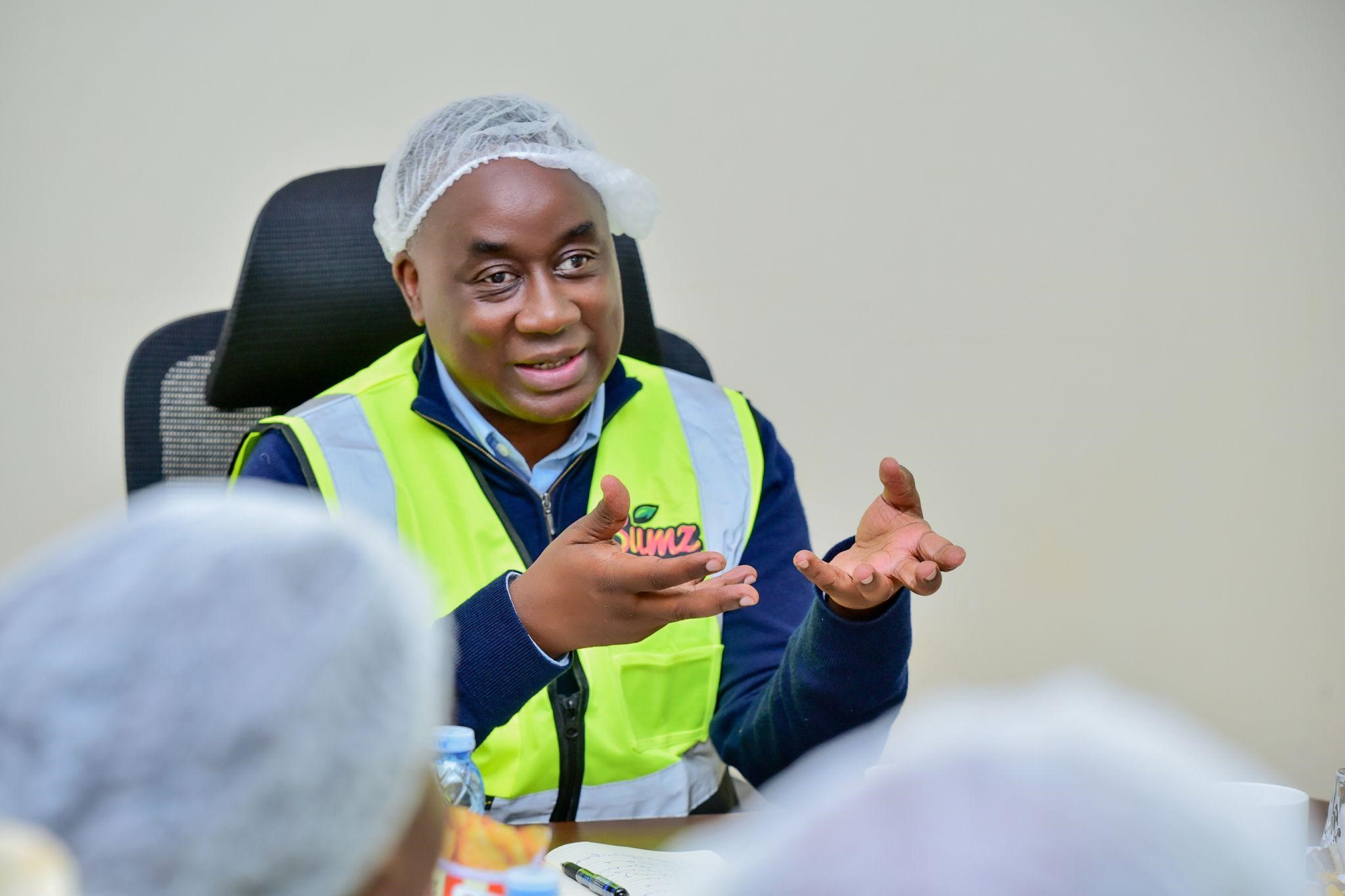
Curriculum Co-Creation and Staff Exchange
Beyond student placements, discussions also focused on co-developing academic content that responds more directly to industry needs, particularly within the manufacturing value chain.
Proposals included guest lectures by industry practitioners, staff exchange programmes to expose academic staff to factory operations, and tailored short courses for Psalms staff based on identified skills gaps.
Dr. Jude Mugarura, Head of the Department of Marketing and Management at COBAMS, emphasised the importance of embedding the partnership within academic programming. He proposed “internships for students in HR, marketing, international business, accounting and finance,” as well as staff exchanges to give University staff hands-on exposure to manufacturing operations.
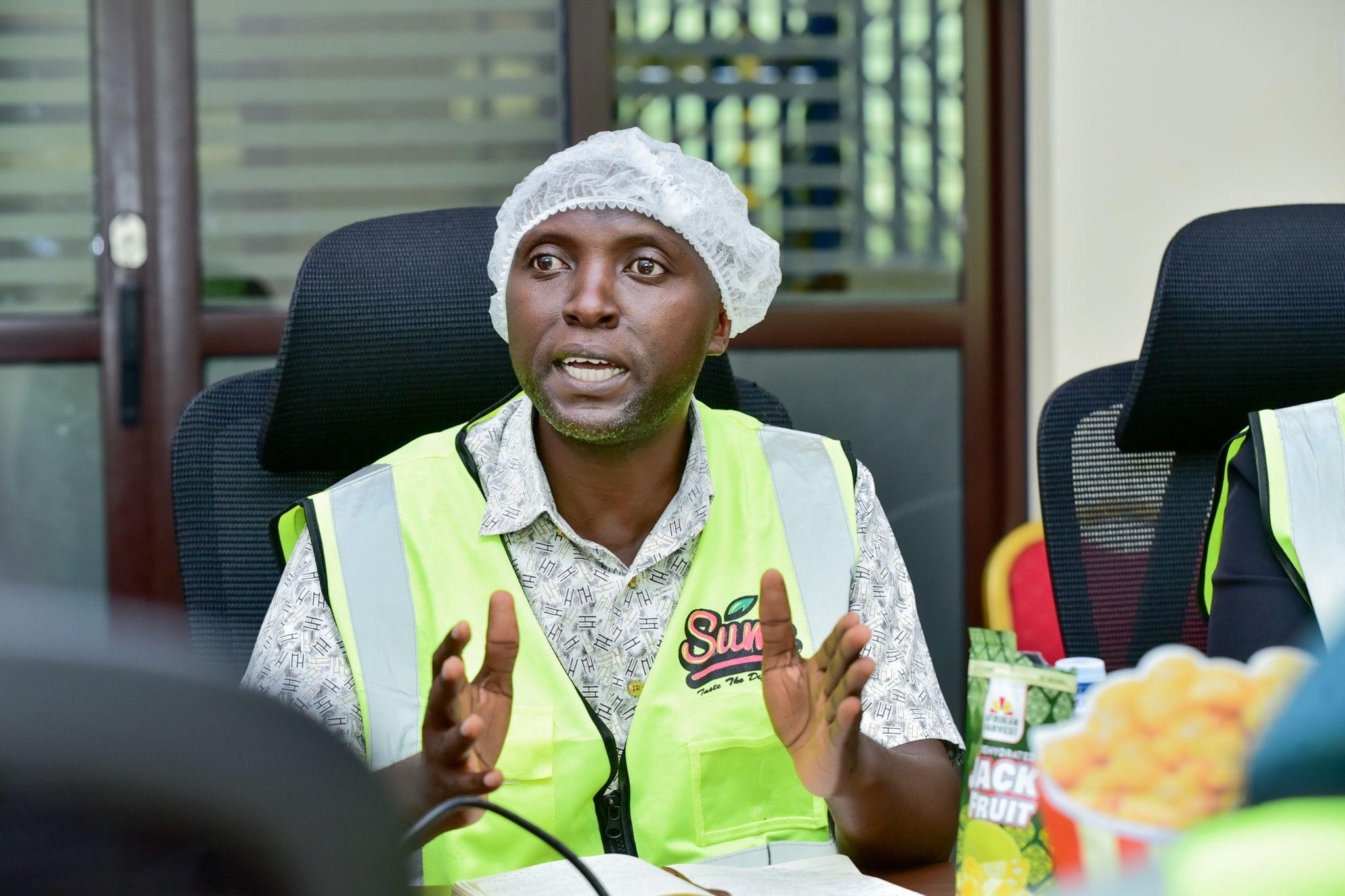
He further suggested specialised courses tailored to the factory’s needs and attachment of research students interested in manufacturing. Such collaboration would contribute to curriculum responsiveness and ensure that graduates are equipped with market-relevant competencies.
Strengthening University–Industry Linkages
The engagement reflects Makerere University’s continued commitment to strengthening partnerships that bridge knowledge generation and real-sector application.
Both institutions expressed a shared vision of building a structured, mutually beneficial collaboration that integrates research, innovation, skills development, and enterprise growth, positioning the University as a key knowledge partner in Uganda’s manufacturing transformation.
Discussions remain ongoing as both parties refine priority areas for formalisation.
Caroline Kainomugisha is the Communications Officer, Advancement Office.
General
Makerere University commemorates 13 transformative years of partnership with Mastercard Foundation
Published
3 days agoon
March 2, 2026
On Friday, 27th February 2026, Makerere University proudly celebrated 13 years of a significant partnership with the Mastercard Foundation, a prestigious independent organisation headquartered in Toronto, Canada. Since its inception in 2013 with the launch of the Scholars Program-currently headed by Prof. Justine Namaalwa, this collaboration has grown significantly, expanding to include two additional initiatives: The E-learning Initiative-headed by Prof. Paul Muyinda Birevu and the Africa Climate Collaborative-headed by Prof. Gorretie Nabanoga. This long-term partnership underscores the shared commitment to fostering education, innovation, and sustainability in Uganda and across Africa.
The colourful event coincided with the 76th Graduation Ceremony, during which Makerere University honoured Ms. Reeta Roy, the Founding President and CEO of the Mastercard Foundation, with an honorary Doctor of Laws.

In her commencement speech, Ms. Roy thanked Makerere University for considering a partnership with the Mastercard Foundation and for conferring upon her a prestigious honorary award.
“Mastercard Foundation is honoured to collaborate with this esteemed university, and I appreciate the recognition through this award. I am excited to be associated with Makerere University and look forward to actively embodying its values. Joining the broader community of alumni from this distinguished institution is a privilege, and I am eager to contribute to its legacy,” stated Ms. Roy.

During the reception in honour of Ms. Roy, the Chairperson of Makerere University Council, Dr. Lorna Magara, acknowledged the invaluable support from the Mastercard Foundation. She emphasised the profound impact of the Foundation’s various initiatives, particularly the scholarships for disadvantaged youth, which enable them to access higher education and opportunities that might have otherwise been beyond their reach.
“On behalf of the Makerere University Council and the broader University community, I extend our sincere gratitude to Mastercard Foundation for its commitment to collaborating with Makerere University in various endeavours, especially for providing scholarships to our underprivileged young people who would never have stepped inside a lecture room at the University.” Dr. Magara stated.

Dr. Magara, in a special way, thanked Ms. Roy for her transformative leadership and unwavering commitment to supporting young people in Africa, citing her efforts to ensure young people get their voices heard.
“As a university, our business is with young people. We are therefore committed to providing the environment and education that deliver meaningful pathways. We will provide an environment that ensures young people have a voice and agency to create meaningful change in society.” Dr. Magara pledged.

Dr. Magara further congratulated Ms. Roy on her honorary Doctor of Laws from Makerere University, noting that it is the university’s highest honour for individuals who have excelled in their careers.
“On behalf of the Makerere University community, I would like to extend my heartfelt congratulations on your honorary Doctor of Laws. This esteemed recognition represents the highest honour our institution can bestow on individuals who have demonstrated exceptional achievement and excellence across various facets of their career.” Dr. Magara remarked.
Prof. Justine Namaalwa, the Program Director of the Mastercard Foundation Scholars Program and the Coordinator for all Mastercard Foundation Initiatives at Makerere University, expressed her appreciation for the thirteen-year collaboration between Makerere University and the Mastercard Foundation. She highlighted that the partnership had yielded significant, impactful results.

“In 2013, Makerere University partnered with the Mastercard Foundation to educate the next generation of transformative African leaders who can positively impact their lives, their communities, and the economies of Africa. The partnership has had a significant impact. I thank the University Management and the Foundation team for this visionary collaboration,” remarked Prof. Namaalwa.
Prof. Namaalwa articulated that the partnership with the Mastercard Foundation is primarily focused on empowering young people as agents of change for transformational leadership in Africa. She presented compelling statistics demonstrating the positive impact of the scholars’ program, highlighting the success of individuals who have completed their education and their subsequent professional experiences after university graduation.

“This partnership focuses on young people, aiming to create positive change in their lives. To date, the Scholars Program has graduated 974 alumni, with 48% securing formal employment, 18% starting their own businesses, 8% participating in internships, and 5% pursuing further education. Overall, 72% of Scholar alumni are actively engaged in employment or entrepreneurship,” Prof. Namaalwa stated.
The colourful event showcased a dynamic array of activities that highlighted the entrepreneurial spirit of Scholars and alumni from the Mastercard Foundation at Makerere University. Attendees enjoyed a mini-exhibition featuring innovative products from these ventures.

A video documentary illustrated the positive impact of the three Mastercard Foundation initiatives. The event also featured inspiring poetry recitations by Scholars and a lively atmosphere of music and dance, creating an engaging and memorable experience for all participants.
The high-level event was attended by senior University officials, led by the Chairperson of Council, Dr. Lorna Magara; the Vice-Chancellor, Prof. Barnabas Nawangwe; the Vice-Chancellor, Academic Affairs, Prof. Sarah Ssali, Deputy, and the Ag. Deputy Vice-Chancellor, Finance and Administration Prof. Winston Tumps Ireeta. Mr Yusuf Kiranda, the University Secretary; and Prof. Buyinza Mukadasi, the Academic Registrar, Chancellor Emeritus-Prof. Ezra Suruma, former Chairperson of the Steering Committee of Mastercard Foundation Scholars Program-Prof. Umar Kakumba, and the Deputy Executive Secretary, RUFORUM, and former Program Coordinator of the Scholars Program at Makerere University-Dr. Florence Nakayiwa, among many other officials graced the function.

The event was also graced by a high-level delegation from the Mastercard Foundation, led by Ms. Reeta Roy, the Founding President of the Foundation, and included the Mastercard Foundation Teams from the Country offices in Kigali, Nairobi, and Kampala; the Program partners; the Mentors, Scholars and alumni; as well as the Program staff of the three Mastercard Foundation Initiatives at Makerere University.
At the end of the event, Makerere University honoured Ms. Reeta Roy with University memorabilia, including a pencil-drawn portrait, a pencil-drawn photo of the Ivory Tower, and other Ugandan crafts. Ms. Roy cut a graduation cake together with the 10 graduates of the 76th graduation ceremony from the Mastercard Foundation Scholars Program.
Bernard Buteera is the Principal Public Relations Officer for the Mastercard Foundation Scholars Program at Makerere University.

It is with great pleasure that I welcome you to this edition of Mak News Magazine, a publication that continues to chronicle Makerere University’s journey as a centre of academic excellence, innovation, and societal transformation.
The stories featured in this issue vividly demonstrate Makerere’s unwavering commitment to addressing national, regional, and global challenges through research, partnerships, and people-centred solutions. They reflect a university that is deeply engaged with society, one that applies knowledge not only to advance scholarship, but also to improve lives.
A recurring theme in this edition is innovation for resilience and inclusion. From the College of Agricultural and Environmental Sciences’ Healthy Soy Initiative combating child malnutrition amid climate change, to the cutting-edge work of CEDAT’s Team Green Minds integrating IoT into agriculture, Makerere continues to harness science and technology to respond to pressing development needs. Equally inspiring is the College of Natural Sciences’ success in securing international funding to scale up fish processing technologies, with a deliberate focus on empowering women and strengthening livelihoods.
This issue also highlights Makerere’s growing role in advancing health and wellbeing. The launch of the Early Intervention Psychiatry Services Clinic at Makerere University Hospital marks an important step in strengthening mental health services, while the Hospital’s transformation from a modest sickbay into a centre of excellence stands as a testament to decades of strategic investment, dedication, and service to the nation.
Our commitment to education access and global engagement is equally evident. Strategic partnerships, such as that between the College of Education and External Studies and the Uganda Vocational and Technical Assessment Board, are expanding pathways to quality education. The establishment of the first-ever United States Studies Centre in the Great Lakes Region positions Makerere as a hub for dialogue, research, and policy engagement on global affairs. We also celebrate our vibrant international community, with graduates drawn from 67 nationalities—affirming Makerere’s status as a truly global university.
This edition further showcases initiatives that ensure long-term institutional sustainability, including the launch of the CoCIS Endowment Fund, infrastructure developments such as the modern hostel at Buyana Farm, and transformative programmes supported by the Mastercard Foundation that continue to empower young people across the continent.
As you read through these pages, I invite you to reflect on the collective effort of our students, staff, alumni, partners, and supporters whose contributions make these achievements possible. Together, we continue to shape Makerere University as a place where knowledge serves humanity.
I wish you an engaging and inspiring read.
Prof. Barnabas Nawangwe
VICE CHANCELLOR
Trending
-

 Humanities & Social Sciences1 week ago
Humanities & Social Sciences1 week agoMeet Najjuka Whitney, The Girl Who Missed Law and Found Her Voice
-

 General1 week ago
General1 week ago76th Graduation Highlights
-

 Agriculture & Environment2 weeks ago
Agriculture & Environment2 weeks agoUganda Martyrs Namugongo Students Turn Organic Waste into Soap in an Innovative School Project on Sustainable Waste Management
-

 Health2 weeks ago
Health2 weeks agoMakerere University School of Public Health Graduates First Cohort of Cost-Effectiveness Analysis Short Course
-

 Agriculture & Environment1 week ago
Agriculture & Environment1 week agoCAES Presents Overall Best Performing Student in the Sciences & a Record 28 PhDs at the 76th Graduation Ceremony
